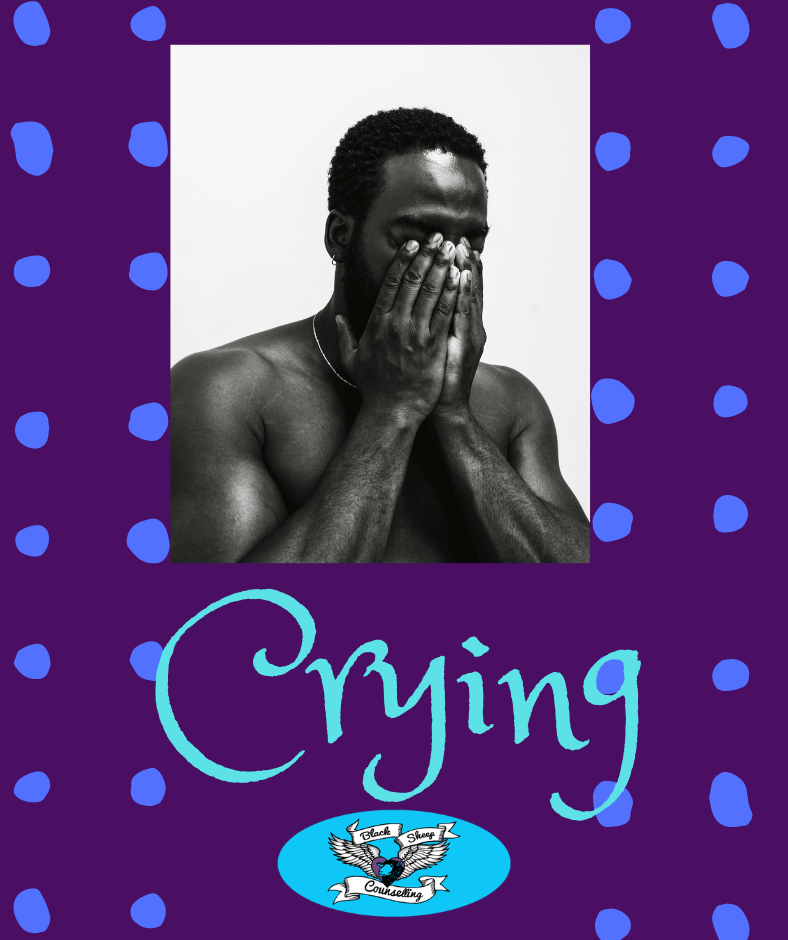The Benefits of Crying

Are you comfortable with crying? Countless people are not. In my role as a therapist, I hear people daily apologize for their tears (and for the record: tears are always welcome with me).
Adults are quick to shut down the crying of children byway of distraction (“look, here’s a toy!”), minimization/invalidation (“there is no reason to cry”), reward/manipulation (“if you stop crying, I’ll buy you a treat”), or commanding them to stop (“stop crying”). Arguably the worst reaction is, “Stop crying or I’ll give you something to cry about”, which denotes the adult is triggered by the child’s crying, usually because of their own [unhealed] trauma history. One cannot hold genuine and compassionate space for the emotions of others if they are not comfortable with their own emotionality.
MANY of us received early life messages that planted both explicit and implicit beliefs that crying is not okay. When I was a child and cried, I used to hide myself in my bedroom or a closet. I don’t recall my parents ever markedly telling not to cry, but I certainly received an unspoken message that crying was something to be ashamed of.
This shame around crying is really f*^$ed up.
Crying is a built-in self-regulation tool. We humans are meant to feel a wide array of emotions: some pleasant, some not-so-pleasant. We need to process these emotions so they don’t fester and make us ill (suppressed emotions and stress result in things like panic attacks, somatic complaints like headaches and stomach aches and when this has gone on for too long, it gives rise to autoimmune diseases). When we selectively numb emotions, we are inadvertently numbing all of them. Research shows that they key to wholehearted living is that when we make space for uncomfortable emotions we increase happiness and overall well-being (ironically, the avoidance of uncomfortable emotions gives rise to greater unhappiness).
Evidence on the benefits of crying:
~Tears contain stress hormones. Crying is a way of purging our body of these (sometimes pent-up) stress hormones ~ this is why we often feel tired and more relaxed after a bout of crying.
~The act of crying activates our parasympathetic nervous system (the part of our autonomic nervous system that includes ‘rest’ and ‘digest’) ~ this helps restore a sense of calm to our bodies.
~Your emotions and your hormones are inherently linked. When a distressing event occurs, it sends hormones coursing though our bodies. Crying is our mind and body’s way to restore balance in our system after a physical or emotional shock. We don’t only cry when we are sad, we also cry when we feel moved, happy, scared, or overwhelmed. Tears help our body restore emotional equilibrium.
~Crying in the presence of a safe witness activates our social engagement system which produces a felt sense of safety in the body and can undo one’s feelings of alone-ness.
~Tears release oxytocin and endorphins, feel good hormones that alleviate both physical and emotional pain.
Physical Benefits of Crying:
- Basal tears wash out bacteria and keep the eyes moist, thus reducing vision impairment and eyesight problems.
- Because crying lowers cortisol levels and reduces stress, it helps boost our immune system and makes us less susceptible to the cold and flu (suppressed emotions = suppressed immune system).
- Studies show that post-cry, people have lowered blood pressure and a steadier pulse, due to reduced stress levels
- Crying reduces physical pain by releasing pleasure-producing hormones (like oxytocin) that help increase pain tolerance
Just like our bodies alert us to a need to hydrate, urinate, cough, sneeze, or sleep, crying is another automatic mechanism that we need to stop impeding from doing its intended work.
We *know* that going long periods of time without nourishing, hydrating, sleeping, or eliminating is harmful to us…so too is suppressing our tears and emotions.
Caveat:
One needs to lean into being okay with crying to reap its benefits. If you are stifling a cry, you are suppressing emotion, thus impeding healthy emotional processing. Challenge those cognitive distortions that led you to believe that crying is not okay ~ most of the messages we received about this came from our parents, who also received the same messages from their parents. We now know better and can adapt healthier – and more accurate – beliefs.
There is such as thing as unhealthy crying. Unhealthy crying keeps us stuck in self-pity, rumination and blaming others for our problems, rather than focusing on validating our own emotional experience to better process it.

